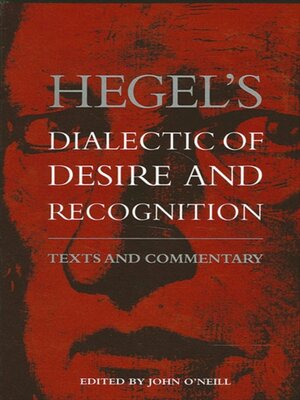Hegel's Dialectic of Desire and Recognition
ebook ∣ Texts and Commentary · SUNY series in the Philosophy of the Social Sciences
By John O'Neill

Sign up to save your library
With an OverDrive account, you can save your favorite libraries for at-a-glance information about availability. Find out more about OverDrive accounts.
Find this title in Libby, the library reading app by OverDrive.



Search for a digital library with this title
Title found at these libraries:
| Library Name | Distance |
|---|---|
| Loading... |
Presents three generations of German, French, and Anglo-American thinking on the Hegelian narrative of desire, recognition, and alienation in life, labor, and language.
This book presents three generations of German, French, and Anglo-American thinking on the Hegelian narrative of desire, recognition, and alienation in life, labor, and language-a narrative that has been subject to extensive commentary in philosophy, literature, psychoanalysis, and feminist thought. The texts focus on a central topos in Western thought, the story of self-consciousness awakened in nature and in history. John O'Neill argues that current postmodern rejections of the Hegelian-Marxist narrative demand an understanding of the texts included here. Without Hegel and Marx in our toolbox, he argues, we will flounder in a world marked by the split between postmodern indifference and premodern passion.
The book makes a strong selection from the history of Hegelian-Marxist debate, hermeneutical and critical theory, and Freudian/Lacanian and feminist commentary on the dialectic of desire and recognition, on the levels of social psychology and political economy. Included are articles by Karl Marx, G. W. F. Hegel, Alexandre Kojève, Jean Hyppolite, Jean-Paul Sarte, Georg Lukács, Jürgen Habermas, Hans-Georg Gadamer, Howard Adelman, Shlomo Avineri, Jessica Benjamin, Edward S. Casey and J. Melvin Woody, Henry S. Harris, George Armstrong Kelly, Ludwig Siep, Judith N. Shklar, and Henry Sussman. The texts and commentaries show how the Hegelian-Maxist narrative of desire, recognition, and alienation is a contested story, one in which class, race, and gender issues are drawn into a historical romance that is being rewritten in contemporary cultural politics.







